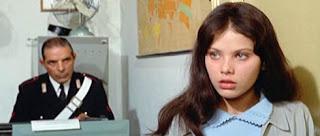
"We're not on Earth to be happy, Francesca!"
Damiano Damiani's The Most Beautiful Wife (1971) seems curiously topical. Commendable in its tasteful presentation of sensational material, it mirrors debates on gender politics and rape culture we'll still having a half-century later.Fourteen year old Francesca Cimarosa (Ornella Muti) gains the attention of Vito Juvara (Alessio Orano), nephew of a Sicilian Mafioso (Amerigo Tot). When Francesca rebuffs Vito's advances, Vito rapes Francesca. Then he tries to force her into marriage, a traditional customer that will redeem her honor. Francesca refuses, incurring Vito's wrath, the scorn of locals and her parents' distrust. Undeterred, Francesca presses charges against Vito, at risk to herself and her family.
Based on the real case of Franca Viola, The Most Beautiful Wife sounds like a chintzy Lifetime movie. Fortunately, Damiani opts for restraint, keeping Francesca's rape off-screen and avoiding romanticization. Vito's attention builds from flirtation to abduction, turning a crush into a nightmare. Damiani stages a nightmarish engagement party, with Francesca terrified by Vito's boisterous, hard-drinking family (with Ennio Morricone's music, infused with soprano and Jew's harp, adding a discordant note). The only forced scene has Francesca burning her father's barn to spur action, an invention that seems overwrought.
Damiani offers a few gangster film tropes, notably a subplot where Vito deals with a treacherous hitman (Joe Sentieri). But Wife's mainly concerned with attacking Sicilian patriarchy, cornering a centuries-old custom that consigns women to property. Sicily's patriarchal laws allow a rapist to marry their victim and avoid prosecution. Vito intimidates Francesca's suitor and murders the family goat, knowing he's untouchable. His assault consigns Francesca to dishonor; if she refuses to marry him, she's a "defiled" woman ostracized by society, his action a youthful indiscretion.
Francesca endures mockery from police, insults from her parents (terrified of Vito's family) and threats from townspeople. Vito claims he broke off the marriage because she wasn't a virgin, an explanation the town readily swallows. Who'd believe a teenaged girl about rape? Francesca stands tall against physical threats and the social assault on her dignity. More headstrong teenager than witting feminist, her defiance and determination nonetheless wins us over.
Ornella Muti, just fourteen during filming, makes a striking heroine. Muti is a very credible teenager, never seeming too smart or socially engaged; she's an unwitting heroine unwilling to back down. Alessio Orano is a preening creep, masking sociopathy behind glaring eyes and a silky smile. Tano Cimarosa makes an impression as Francesca's disbelieving father. Amerigo Tot, the Hungarian sculptor-actor recognizable from The Godfather Part II, plays Vito's uncle.
If The Most Beautiful Wife were set in 19th Century Italy or a Middle Eastern theocracy, its story might seem shocking but comfortably distant. But Franca Viola's case is only 50 years old, the law that enabled it not repealed until 1981. And we still feel echoes of the cultural misogyny that ostracizes victims while excusing their attackers.

